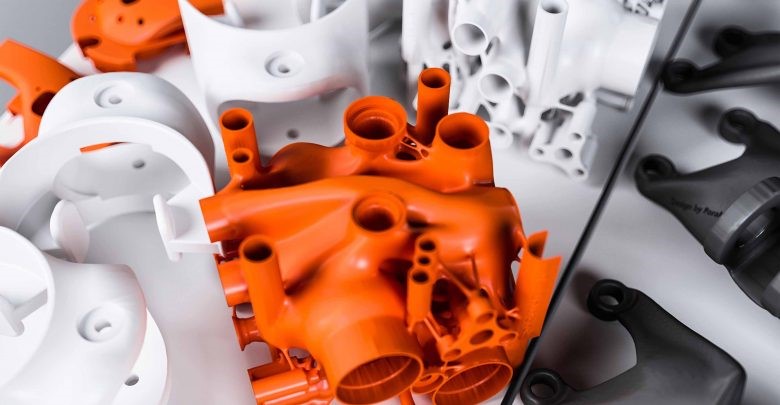Partnership underscores both companies’ commitment to increase the adoption of additive manufacturing through collaborations that deliver orders of magnitude productivity improvements and sustainable production
DSM’s Arnite T AM1210 (P) is the first-ever polybutylene terephthalate (PBT) powder commercially available for series production of industrial and automotive electronics
Nexa3D to include DSM’s PBT laser sintering material in its Quantum Laser Sintering QLS 350 starter kit beginning Q1 2021
Royal DSM, a global science-based company in Nutrition, Health and Sustainable Living, and Nexa3D, the maker of ultrafast polymer production 3D printers, today announced a partnership to fast track the availability of Nexa3D’s QLS-350 systems with DSM’s supply chain-approved laser sintering powders for series production. Under this collaboration, Nexa3D plans to immediately include DSM’s first-ever PBT laser sintering material, Arnite® T AM1210 (P), with every Quantum Laser Sintering QLS™ 350 system it sells commercially starting in the first quarter of 2021.
“We are very excited to partner with Nexa3D, the company that is breaking traditional additive manufacturing (AM) speed and productivity barriers, to deliver our first ever PBT laser sintering material through their ultrafast QLS 350 system,” said Hugo da Silva, VP of Additive Manufacturing at DSM. “As we have already witnessed throughout Covid-19, the manufacturing industry sees AM as a viable path to sustain production and build resilient supply chains. This requires accelerated adoption of AM technology and at DSM, we are moving quickly to introduce new materials and collaborate with partners whenever possible.”
This partnership underscores both companies’ strong commitment to accelerate the adoption of sustainable additive manufacturing for series production of electrical connectors, automotive electronics and lighting applications through innovative collaborations that are designed to unlock the full potential of additional performance polymers for additive manufacturing.
"We are thrilled to partner with a company of the caliber of DSM, one of the world’s leading providers of additive manufacturing performance polymers, to jointly deliver the next generation of series production capabilities to our customers," said Avi Reichental, Co-founder and CEO of Nexa3D. “We believe that this collaboration is essential given our combined capabilities to improve polymer production performance orders of magnitude and that this is the right time to realize the combined potential that this partnership unlocks for the benefit of our expanding customer base in the innovative automotive and electronic industries."
The use of laser sintering PBT materials is expected to increase exponentially over the next decade, driven primarily by accelerating innovations in the automotive, electrical, and electronics industries. This trend is especially observed in the automotive industry, where the need for lighter, more sustainable, lower maintenance materials rules future designs. The use of engineer-grade materials such as PBT is expected to increase due to the need to minimize issues surrounding the corrosion of metals and their associated high costs.
Arnite T AM1210 (P) is the first ever PBT powder for laser sintering and is, since its launch in 2019, highly desired and well-known for its series production performance in making end use parts, such as automotive electronics and applications, that need to function under high temperatures. Arnite® T AM1210 (P) has the same dielectric properties as material used in injection molding processes, making it a material familiar to engineers. Developed for a wide sinter window, the powder is extremely easy to print. Additionally, Arnite® T AM1210 (P) is environmentally friendly with a high reuse rate of >60% and recyclable to the extent that the material can be brought back to the powder bed process.
Throughout Covid-19, both companies continue to expand their product portfolios as well as their partnerships and collaborations. This has enabled more customers to strengthen their design agility and supply chain resiliency by compressing their design and manufacturing cycle, effectively reducing the time required to produce functional prototypes and production parts from hours to just minutes.
www.dsm.com

 Deutsch (Germany)
Deutsch (Germany)  Polski (PL)
Polski (PL) 









